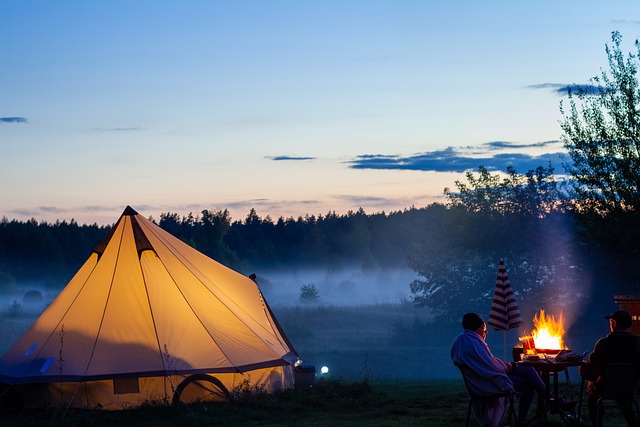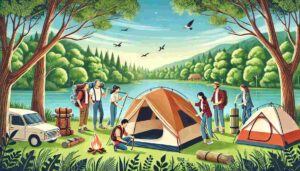Camping is a popular outdoor activity that allows people to escape the hustle and bustle of everyday life and immerse themselves in nature. However, many people wonder if camping is an expensive hobby.
The cost of camping can vary depending on the type of gear, campsites, food, and transportation you choose. However, with proper planning and research, camping can be an affordable way to enjoy the great outdoors and connect with nature.
In this article, I will explore the various costs associated with camping and help you determine whether or not it is an expensive activity. By the end of this article, you will have a better understanding of the costs of camping and how to make it an affordable and enjoyable experience. Whether you’re a seasoned camper or a first-timer, this article will provide valuable information to help you plan your next camping trip.
The cost of camping gear
The cost of camping gear is one of the biggest concerns for those who are considering camping for the first time. The good news is that you don’t have to break the bank to get started. Here are 4 factors to consider when budgeting for camping gear:
- Quality: The quality of your camping gear is essential to ensure your comfort and safety. You don’t want to skimp on quality when it comes to items like your tent or sleeping bag, as they will be your primary shelter and source of warmth. However, you can find high-quality gear at reasonable prices if you do your research.
- Needs vs. wants: Consider what gear is essential versus what is nice to have. For example, a camping stove may be essential if you plan on cooking your meals, but a portable hammock may be a nice-to-have luxury.
- Secondhand options: Consider purchasing secondhand gear from garage sales, thrift stores, or online marketplaces. You can often find good deals on gently used camping gear, but make sure to inspect the items thoroughly before purchasing.
- Renting: If you’re not sure if camping is for you, consider renting gear from a local outdoor gear rental company. This option can be more affordable than purchasing all of your gear upfront, and it allows you to try out different gear before investing in your own.
In general, the cost of camping gear can range from a few hundred dollars to several thousand dollars, depending on the quality and quantity of items you need. To get started, focus on purchasing essential gear first and slowly build up your collection over time. With proper care and maintenance, your gear can last for many years, making camping an affordable and enjoyable activity in the long run.
The cost of campsites
The cost of campsites varies depending on the type of campsite and location. Here are 5 essential factors to consider when budgeting for campsites:
- Public vs. private: Public campsites, such as those in national or state parks, are often less expensive than private campsites, which are typically owned by commercial enterprises. Public campsites may have fewer amenities, but they are often located in beautiful natural settings. (Can you camp in state parks for free?)
- Location: The cost of campsites varies by location. Campsites in popular tourist destinations or high-demand areas may be more expensive than campsites in less-popular areas.
- Type of site: Campsites range from primitive, backcountry sites with no amenities to full-service RV sites with hookups for water and electricity. The more amenities a campsite offers, the higher the cost will typically be.
- Time of year: The cost of campsites can vary depending on the time of year. High season rates may be significantly higher than low season rates.
- Length of stay: Many campsites offer discounts for longer stays, so consider planning a long camping trip to save money.
In general, the cost of campsites can range from $10 to $50 per night, with RV sites and private campsites typically costing more than primitive campsites in public parks. To save money on campsites, consider camping during the off-season, booking campsites in advance, or taking advantage of discounts or rewards programs offered by camping associations or park systems. With a little bit of planning, you can find affordable campsites that allow you to enjoy the great outdoors without breaking the bank.
From Tents to RVs: A guide to Different types of Camping Sites And Accommodations
The cost of food and supplies
The cost of food and supplies for camping can vary widely depending on your preferences and needs. Here are 5 common factors to consider when budgeting for food and supplies:
- Meal planning: Planning your meals ahead of time can save you money and ensure that you have enough food for your trip. Consider bringing non-perishable items like canned goods, dried fruits, and nuts, as well as items that can be easily prepared on a camp stove or over a fire.
- Cooking equipment: If you plan on cooking your meals, you will need to invest in cooking equipment such as a stove, pots and pans, utensils, and dishes. Look for items that are durable and lightweight, but also affordable.
- Water: Depending on where you’re camping, you may need to bring your own water or have access to a nearby water source. Consider investing in a water filter or purification system to ensure that you have safe drinking water.
- Other supplies: Other supplies you may need include a cooler, ice, a first aid kit, insect repellent, sunscreen, and toiletries.
- Shopping smart: Shop for camping supplies at discount stores or online retailers, and look for deals on items like camping gear and food in bulk.
In general, the cost of food and supplies for camping can range from a few hundred dollars to a few thousand dollars, depending on how much gear you need to purchase and how many people you’re camping with. To save money on food and supplies, plan your meals ahead of time, shop smart, and bring reusable items like water bottles and utensils to avoid having to purchase disposable items. With a little bit of planning, you can enjoy delicious meals and a comfortable camping experience without spending a fortune.
The cost of transportation
The cost of transportation for camping can vary widely depending on how far you need to travel and what type of transportation you choose. Here 5 factors you must consider when budgeting for transportation:
- Mode of transportation: The most common modes of transportation for camping are car, RV, and airplane. Car travel is typically the most affordable option, while RV travel can be more expensive due to fuel costs and RV rental fees. Air travel can be the most expensive option, but it may be necessary if you’re camping in a remote location or traveling long distances.
- Gas and maintenance: If you’re driving to your campsite, you’ll need to factor in the cost of gas and maintenance for your vehicle. Be sure to calculate the distance to your campsite and estimate the cost of gas accordingly.
- Rental fees: If you’re renting an RV or other equipment, be sure to factor in rental fees and any additional costs like insurance.
- Parking and camping fees: Many campsites charge fees for parking and camping. Be sure to research these fees ahead of time and include them in your budget.
- Alternative transportation: Consider alternative modes of transportation like carpooling or public transportation to reduce your transportation costs.
In general, the cost of transportation for camping can range from a few hundred dollars to several thousand dollars, depending on your mode of transportation and how far you need to travel. To save money on transportation, consider carpooling, renting a fuel-efficient vehicle, or using rewards points to book flights or rental cars. With a little bit of planning, you can find affordable transportation options that allow you to enjoy the great outdoors without breaking the bank.
Conclusion
In conclusion, camping can be an affordable and enjoyable way to connect with nature and spend time with loved ones. While there are costs associated with camping, with a little bit of planning and research, you can make it a budget-friendly activity.
When budgeting for camping, consider the costs of camping gear, campsites, food and supplies, and transportation. Look for deals on gear and supplies, and consider renting or buying used equipment to save money. When it comes to campsites, consider public campsites and off-season rates to reduce your costs. Plan your meals ahead of time and shop smart to save money on food and supplies. And finally, consider alternative modes of transportation and look for deals on flights or rental cars to reduce your transportation costs.
Overall, camping can be a fun and affordable way to escape from the stresses of everyday life and immerse yourself in the great outdoors. By following the tips in this article, you can plan a camping trip that fits your budget and allows you to enjoy all that nature has to offer.










